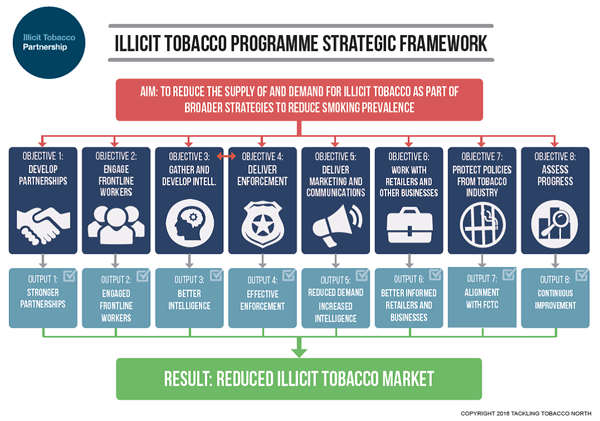Home
Issues
Aims and Scope
Open Access
Editorial Board
Indexing
Why publish with us
Contact us
Instructions to authors (PDF)
Manuscript Types
Manuscript Formatting
How to submit
Preprints
Special Publications & Reprints
Authorship & COI
Principles of Transparency Checklist
Data Policies
Publication Ethics and Publication Malpractice Statement
Implementing a sub-national strategic framework to reduce the illicit tobacco market to support national strategies
1
Fresh, United Kingdom
Publication date: 2018-03-01
Tob. Induc. Dis. 2018;16(Suppl 1):A122
KEYWORDS
TOPICS
ABSTRACT
Background and challenges to implementation:
North East (NE) England has had the fastest drops in smoking prevalence in the country. The UK's illicit tobacco market has almost halved following successful national strategies but still remains a problem in some communities because price and availability increases accessibility for children and reduces smokers' motivation to quit. In 2009, 16% of the NE tobacco market was illicit. Fresh, the NE's comprehensive tobacco control programme, has implemented an innovative and successful strategic framework to reduce the supply and demand.
Intervention or response:
Since 2007, Fresh has worked with health and regulatory partners to reduce the illicit tobacco market. Several waves of quantitative and qualitative research with the public and stakeholders have informed the development of a multi-component strategic framework based on international principles which enhances national strategies and can be implemented locally or sub-nationally. Its eight objectives are to develop partnerships, engage frontline workers, generate intelligence, deliver enforcement, deliver marketing and communications, work with businesses, protect policies from the tobacco industry and assess progress.

[Illicit Tobacco Programme Strategic Framework]
Results and lessons learnt:
The illicit tobacco market in the NE has declined from 16% in 2009 to 12% in 2017. The proportion of smokers who buy illicit tobacco has reduced from 24% to 18% over the same timeframe. In-depth qualitative research has supported the development of effective, evidence-based demand reduction campaigns which have led to increases in intelligence and reductions in comfort levels with the illicit tobacco trade. Regulatory partners are prioritising illicit tobacco as part of their broader enforcement policies.
Conclusions and key recommendations:
The success of this strategic framework demonstrates that activity can be co-ordinated locally or sub-nationally to support national strategies to reduce the illicit tobacco market. Activity should always be placed within the broader context of 'all tobacco kills' and should contain measures to reduce both supply and demand. Useful resources for other programmes and settings can be found at www.illicit-tobacco.co.uk.
North East (NE) England has had the fastest drops in smoking prevalence in the country. The UK's illicit tobacco market has almost halved following successful national strategies but still remains a problem in some communities because price and availability increases accessibility for children and reduces smokers' motivation to quit. In 2009, 16% of the NE tobacco market was illicit. Fresh, the NE's comprehensive tobacco control programme, has implemented an innovative and successful strategic framework to reduce the supply and demand.
Intervention or response:
Since 2007, Fresh has worked with health and regulatory partners to reduce the illicit tobacco market. Several waves of quantitative and qualitative research with the public and stakeholders have informed the development of a multi-component strategic framework based on international principles which enhances national strategies and can be implemented locally or sub-nationally. Its eight objectives are to develop partnerships, engage frontline workers, generate intelligence, deliver enforcement, deliver marketing and communications, work with businesses, protect policies from the tobacco industry and assess progress.

[Illicit Tobacco Programme Strategic Framework]
Results and lessons learnt:
The illicit tobacco market in the NE has declined from 16% in 2009 to 12% in 2017. The proportion of smokers who buy illicit tobacco has reduced from 24% to 18% over the same timeframe. In-depth qualitative research has supported the development of effective, evidence-based demand reduction campaigns which have led to increases in intelligence and reductions in comfort levels with the illicit tobacco trade. Regulatory partners are prioritising illicit tobacco as part of their broader enforcement policies.
Conclusions and key recommendations:
The success of this strategic framework demonstrates that activity can be co-ordinated locally or sub-nationally to support national strategies to reduce the illicit tobacco market. Activity should always be placed within the broader context of 'all tobacco kills' and should contain measures to reduce both supply and demand. Useful resources for other programmes and settings can be found at www.illicit-tobacco.co.uk.
Share
RELATED ARTICLE
We process personal data collected when visiting the website. The function of obtaining information about users and their behavior is carried out by voluntarily entered information in forms and saving cookies in end devices. Data, including cookies, are used to provide services, improve the user experience and to analyze the traffic in accordance with the Privacy policy. Data are also collected and processed by Google Analytics tool (more).
You can change cookies settings in your browser. Restricted use of cookies in the browser configuration may affect some functionalities of the website.
You can change cookies settings in your browser. Restricted use of cookies in the browser configuration may affect some functionalities of the website.

